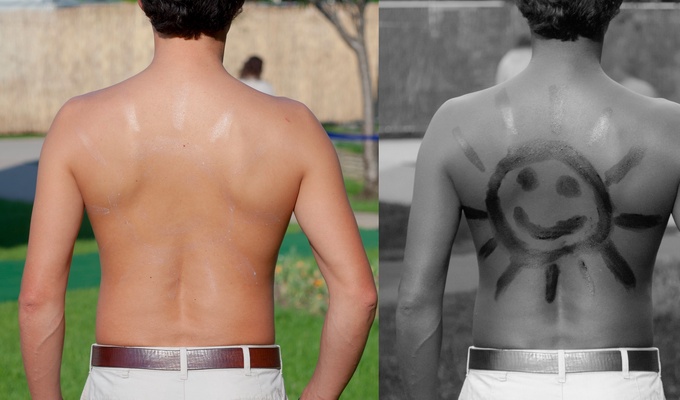Sunscreen, also known as sunblock or sun cream, is a photoprotective topical product for the skin that mainly absorbs, or to a much lesser extent reflects, some of the sun's ultraviolet radiation and thus helps protect against sunburn and most importantly prevent skin cancer. Sunscreens come as lotions, sprays, gels, foams, sticks, powders and other topical products. Sunscreens are common supplements to clothing, particularly sunglasses, sunhats and special sun protective clothing, and other forms of photoprotection .
The first sunscreen in the world was invented in Australia, by chemist H.A. Milton Blake, in 1932 formulating with the UV filter 'salol' (phenyl salicylate) at a concentration of 10%. Its protection was verified by the University of Adelaide and it was also produced commercially by Blake's company, Hamilton Laboratories. Despite sunscreen being relatively new, sun protection practices have been observed since at least the ancient Egyptians "who used ingredients such as rice bran, jasmine, and lupine" to provide sun protection.
Sunscreens are classified into mineral (also referred to as physical) sunscreens (i.e., zinc oxide and titanium dioxide) and chemical (also referred to as petrochemical, as they are typically derived from petroleum) sunscreens.
Research by the FDA on the safety of the main three organic UV filters (oxybenzone, homosalate and octocrylene) found that the three ingredients could be detected on the skin, in blood, in breast milk and in urine samples weeks after no longer being used.
Medical organizations such as the American Cancer Society recommend the use of sunscreen because it aids in the prevention of squamous cell carcinomas. The routine use of sunscreens may also reduce the risk of melanoma. However, many sunscreens do not block ultraviolet A (UVA) radiation, yet protection from UVA is important for the prevention of skin cancer.
To provide a better indication of their ability to protect against skin cancer and other diseases associated with UVA radiation (such as phytophotodermatitis), the use of broad-spectrum (UVA/UVB) sunscreens has been recommended.
In the United States, sunscreens are required to remain effective at original strength for at least three years. Some sunscreens include an expiration date—a date indicating when they may become less effective.
